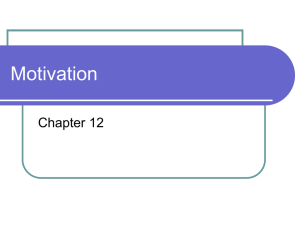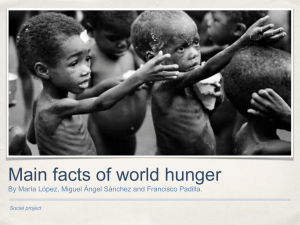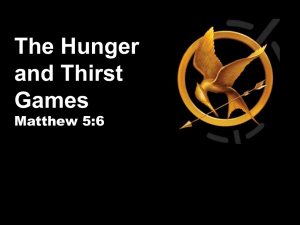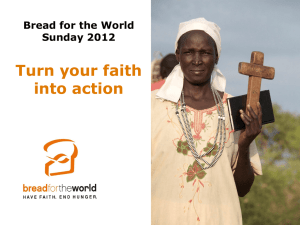Excerpt from Black Boy
advertisement
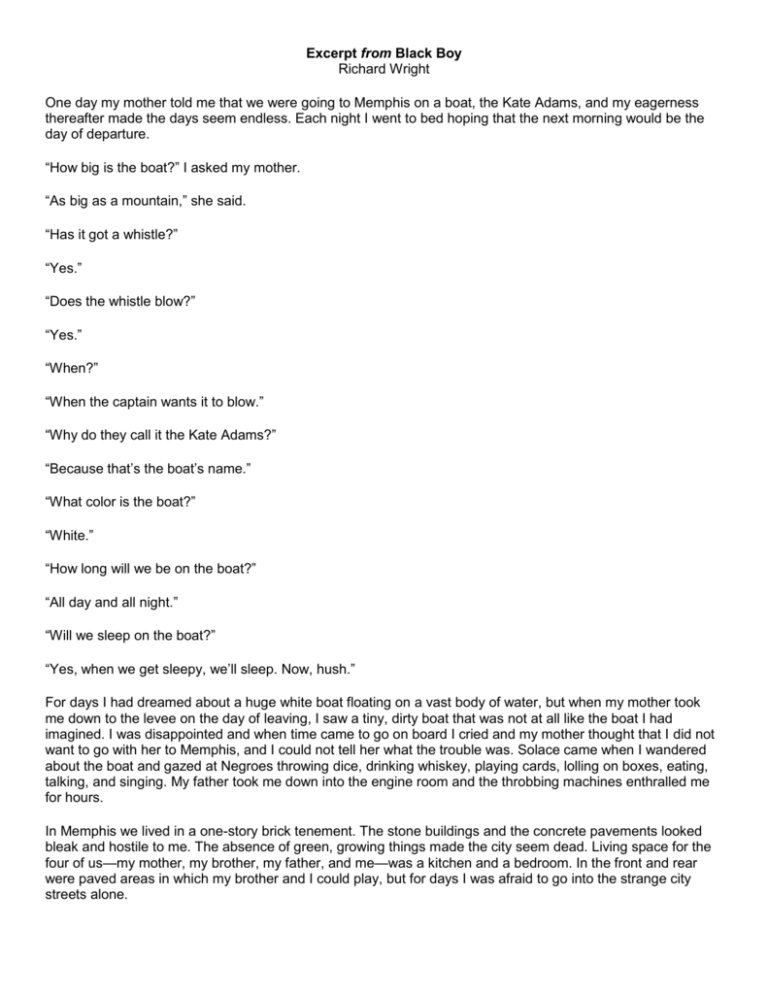
Excerpt from Black Boy Richard Wright One day my mother told me that we were going to Memphis on a boat, the Kate Adams, and my eagerness thereafter made the days seem endless. Each night I went to bed hoping that the next morning would be the day of departure. “How big is the boat?” I asked my mother. “As big as a mountain,” she said. “Has it got a whistle?” “Yes.” “Does the whistle blow?” “Yes.” “When?” “When the captain wants it to blow.” “Why do they call it the Kate Adams?” “Because that’s the boat’s name.” “What color is the boat?” “White.” “How long will we be on the boat?” “All day and all night.” “Will we sleep on the boat?” “Yes, when we get sleepy, we’ll sleep. Now, hush.” For days I had dreamed about a huge white boat floating on a vast body of water, but when my mother took me down to the levee on the day of leaving, I saw a tiny, dirty boat that was not at all like the boat I had imagined. I was disappointed and when time came to go on board I cried and my mother thought that I did not want to go with her to Memphis, and I could not tell her what the trouble was. Solace came when I wandered about the boat and gazed at Negroes throwing dice, drinking whiskey, playing cards, lolling on boxes, eating, talking, and singing. My father took me down into the engine room and the throbbing machines enthralled me for hours. In Memphis we lived in a one-story brick tenement. The stone buildings and the concrete pavements looked bleak and hostile to me. The absence of green, growing things made the city seem dead. Living space for the four of us—my mother, my brother, my father, and me—was a kitchen and a bedroom. In the front and rear were paved areas in which my brother and I could play, but for days I was afraid to go into the strange city streets alone. It was in this tenement that the personality of my father first came fully into the orbit of my concern. He worked as a night porter in a Beale Street drugstore and he became important and forbidding to me only when I learned that I could not make noise when he was asleep in the daytime. He was the lawgiver in our family and I never laughed in his presence. I used to lurk timidly in the kitchen doorway and watch his huge body sitting slumped at the table. I stared at him with awe as he gulped his beer from a tin bucket, as he ate long and heavily, sighed, belched, closed his eyes to nod on a stuffed belly. He was quite fat and his bloated stomach always lapped over his belt. He was always a stranger to me, always somehow alien and remote. . . . Hunger stole upon me so slowly that at first I was not aware of what hunger really meant. Hunger had always been more or less at my elbow when I played, but now I began to wake up at night to find hunger standing at my bedside, staring at me gauntly. The hunger I had known before this had been no grim, hostile stranger; it had been a normal hunger that had made me beg constantly for bread, and when I ate a crust or two I was satisfied. But this new hunger baffled me, scared me, made me angry and insistent. Whenever I begged for food now my mother would pour me a cup of tea which would still the clamor in my stomach for a moment or two; but a little later I would feel hunger nudging my ribs, twisting my empty guts until they ached. I would grow dizzy and my vision would dim. I became less active in my play, and for the first time in my life I had to pause and think of what was happening to me. “Mama, I’m hungry,” I complained one afternoon. “Jump up and catch a kungry,” she said, trying to make me laugh and forget. “What’s a kungry?” “It’s what little boys eat when they get hungry,” she said. “What does it taste like?” “I don’t know.” “Then why do you tell me to catch one?” “Because you said that you were hungry,” she said, smiling. I sensed that she was teasing me and it made me angry. “But I’m hungry. I want to eat.” “You’ll have to wait.” “But I want to eat now.” “But there’s nothing to eat,” she told me. “Why?” “Just because there’s none,” she explained. “But I want to eat,” I said, beginning to cry. “You’ll just have to wait,” she said again. “But why?” “For God to send some food.” “When is He going to send it?” “I don’t know.” “But I’m hungry!” She was ironing and she paused and looked at me with tears in her eyes. “Where’s your father?” she asked me. I stared in bewilderment. Yes, it was true that my father had not come home to sleep for many days now and I could make as much noise as I wanted. Though I had not known why he was absent, I had been glad that he was not there to shout his restrictions at me. But it had never occurred to me that his absence would mean that there would be no food. “I don’t know,” I said. “Who brings food into the house?” my mother asked me. “Papa,” I said. “He always brought food.” “Well, your father isn’t here now,” she said. “Where is he?” “I don’t know,” she said. “You’ll have to wait until I get a job and buy food,” she said. “But I’m hungry,” I whimpered, stomping my feet. As the days slid past, the image of my father became associated with my pangs of hunger, and whenever I felt hunger I thought of him with a deep biological bitterness. My mother finally went to work as a cook and left me and my brother alone in the flat each day with a loaf of bread and a pot of tea. When she returned at evening she would be tired and dispirited and would cry a lot. Sometimes, when she was in despair, she would call us to her and talk to us for hours, telling us that we now had no father, that our lives would be different from those of other children, that we must learn as soon as possible to take care of ourselves, to dress ourselves, to prepare our own food; that we must take upon ourselves the responsibility of the flat while she worked. Half frightened, we would promise solemnly. We did not understand what had happened between our father and our mother and the most that these long talks did to us was to make us feel a vague dread. Whenever we asked why father had left, she would tell us that we were too young to know. One evening my mother told me that thereafter I would have to do the shopping for food. She took me to the corner store to show me the way. I was proud; I felt like a grownup. The next afternoon I looped the basket over my arm and went down the pavement toward the store. When I reached the corner, a gang of boys grabbed me, knocked me down, snatched the basket, took the money, and sent me running home in panic. That evening I told my mother what had happened, but she made no comment; she sat down at once, wrote another note, gave me more money, and sent me out to the grocery again. I crept down the steps and saw the same gang of boys playing down the street. I ran back into the house. “What’s the matter?” my mother asked. “It’s those same boys,” I said. “They’ll beat me.” “You’ve got to get over that,” she said. “Now, go on.” “I’m scared,” I said. “Go on and don’t pay any attention to them,” she said. I went out of the door and walked briskly down the sidewalk, praying that the gang would not molest me. But when I came abreast of them someone shouted. “There he is!” They came toward me and I broke into a wild run toward home. They overtook me and flung me to the pavement. I yelled, pleaded, kicked, but they wrenched the money out of my hand. They yanked me to my feet, gave me a few slaps, and sent me home sobbing. My mother met me at the door. “They b-beat m-me,” I gasped. “They t-t-took the m-money.” I started up the steps, seeking the shelter of the house. “Don’t you come in here,” my mother warned me. I froze in my tracks and stared at her. “But they’re coming after me,” I said. “You just stay right where you are,” she said in a deadly tone. “I’m going to teach you this night to stand up and fight for yourself.” She went into the house and I waited, terrified, wondering what she was about. Presently she returned with more money and another note; she also had a long heavy stick. “Take this money, this note, and this stick,” she said. “Go to the store and buy those groceries. If those boys bother you, then fight.” I was baffled. My mother was telling me to fight, a thing that she had never done before. “But I’m scared,” I said. “Don’t you come into this house until you’ve gotten those groceries,” she said. “They’ll beat me; they’ll beat me,” I said. “Then stay in the streets; don’t come back here!” I ran up the steps and tried to force my way past her into the house. A stinging slap came on my jaw. I stood on the sidewalk, crying. “Please, let me wait until tomorrow,” I begged. “No,” she said. “Go now! If you come back into this house without those groceries, I’ll whip you!” From Black Boy Answer the following in complete sentence supporting with text evidence when necessary. 1. What can you infer about Richard’s mother’s actions? 2. Summarize in 3-5 sentences the excerpt from Black Boy. 3. Write one literal and one interpretive question you have from the story. 4. Do you believe Richard would have taken matters into his own hands if his mother had not forced the situation? Explain. 5. What parallels can you draw from the Black Boy excerpt and Hunger Games? 6. What is one major conflict for the narrator? Choose one of the following: 1. How is the idea of survival important in both Black Boy and The Hunger Games? Be sure to provide text evidence (from both stories) to support your answer. 2. What is one characteristic shared by Katness and Richard? Be sure to provide text evidence (from both stories) to support your answer.

